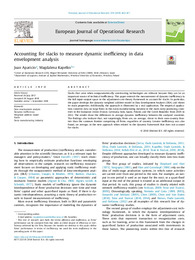Título :
Accounting for slacks to measure dynamic inefficiency in data envelopment analysis |
Autor :
Aparicio, Juan 
Kapelko, Magdalena |
Departamento:
Departamentos de la UMH::Estadística, Matemáticas e Informática |
Fecha de publicación:
2018-09-01 |
URI :
http://hdl.handle.net/11000/6256 |
Resumen :
Slacks that arise when nonparametrically constructing technologies are relevant because they can be an important source of technical inefficiency. This paper extends the measurement of dynamic inefficiency in the full input–output space in the adjustment-cost theory framework to account for slacks. In particular, the paper develops the dynamic weighted additive model in Data Envelopment Analysis (DEA) and shows its main properties. Additionally, the approach is illustrated by a real application. The empirical applica- tion concerns data on large firms in the dairy-manufacturing industry in the main dairy-producing coun- tries in the European Union (France, Germany, Italy, Spain, Poland, and the Czech Republic) from 2005 to 2012. The results show the differences in average dynamic inefficiency between the analyzed countries. The findings also indicate that, not surprisingly, firms are, on average, closer to their own-country fron- tier than the common frontier comprising all firms, regardless of country. Greater inefficiency was also found, on average, in the new approach when related to the dynamic framework that does not account for slacks
|
Palabras clave/Materias:
Data envelopment analysis
Dynamic inefficiency
Weighted additive model
Slacks
Dairy manufacturing industry |
Área de conocimiento :
Análisis matemático |
Tipo de documento :
info:eu-repo/semantics/article |
Derechos de acceso:
info:eu-repo/semantics/openAccess |
DOI :
https://doi.org/10.1016/j.ejor.2018.08.045 |
Aparece en las colecciones:
Artículos - Estadística, Matemáticas e Informática
|
 La licencia se describe como: Atribución-NonComercial-NoDerivada 4.0 Internacional.
La licencia se describe como: Atribución-NonComercial-NoDerivada 4.0 Internacional.
.png)
